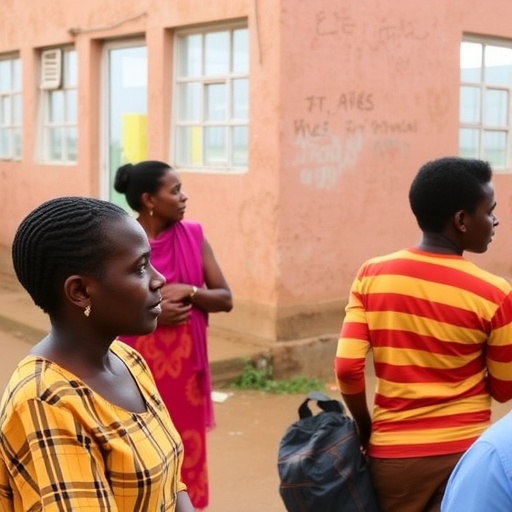In the realm of health research, a significant discourse has emerged surrounding the quality of health services on a global scale. A study recently published by Pruteanu, Moroșanu, and Zegan sheds light on the disparities that exist within the provision of healthcare services and the implications these inequities have for population health. The systematic review conducted by these researchers focuses on data accumulated from 2014 to 2023, offering a comprehensive examination of the quality of health services and identifying urgent gaps requiring attention.
One of the foremost findings of the study highlights the disproportionate access to quality healthcare services experienced by marginalized populations. Community health is profoundly affected by these discrepancies, often leading to heightened morbidity and mortality rates in areas where health services are subpar. The researchers argue that the quality of care is intrinsically linked to healthcare outcomes, and unless significant steps are taken to rectify these inequalities, the global health landscape will remain fraught with challenges.
The comprehensive nature of the review draws from numerous studies conducted worldwide, systematically analyzing factors that contribute to health service quality. By employing both qualitative and quantitative approaches, the researchers present a holistic understanding of the health services quality issue. They delve into various indicators of quality, such as accessibility, efficiency, and patient satisfaction, uncovering alarming trends that warrant immediate action from healthcare policymakers.
Furthermore, the researchers underscore the role that socio-economic factors play in perpetuating health service quality disparities. In many regions, systemic inequities are compounded by economic constraints, limiting the ability of healthcare systems to respond effectively to the needs of their populations. The implications of these findings are profound, suggesting that economic policies must be implemented alongside healthcare reforms to foster a more equitable health environment.
An essential aspect of the study is its emphasis on the need for robust healthcare governance. The authors argue that effective governance structures are critical for ensuring that health services are not only accessible but also of high quality. This includes accountability measures that hold health providers responsible for the quality of care they deliver and ensure that patients are treated with dignity and respect.
The systematic review also identifies the burgeoning impact of technology and digital health solutions in bridging quality gaps. Innovations in telemedicine and mobile health applications have the potential to enhance access to quality healthcare, particularly in underserved areas. However, the researchers caution that without careful implementation strategies and consideration of local contexts, these technologies may inadvertently exacerbate existing disparities.
As the world grapples with emerging health threats, including pandemics and chronic diseases, the findings from this study are timely. The researchers advocate for a paradigm shift in how health services are conceptualized and delivered, emphasizing the need to prioritize equity in healthcare provision. They call for global collaborations that focus not only on enhancing the quality of services but also on restructuring health systems to make them more responsive to the needs of all populations.
Moreover, public engagement is highlighted as a crucial element in the quest for improved health service quality. Involving communities in decision-making processes and ensuring their voices are heard can significantly influence the effectiveness of health policies. The study calls for increased community participation and outlines strategies for empowering those most affected by health service inequities.
In their conclusions, the authors offer a roadmap for future research that builds on their findings. They suggest that longitudinal studies are needed to track progress over time and evaluate the effectiveness of implemented policies aimed at reducing inequity in health services. Additionally, interdisciplinary approaches that combine insights from public health, sociology, and economics could yield richer understandings of the complex landscape of health service quality.
As we move into an era increasingly marked by health challenges and disparities, the call to action presented in this systematic review is clear. Researchers, policymakers, and healthcare providers must collaborate to foster a health ecosystem that prioritizes quality and equity. The consequences of inaction could be dire, perpetuating cycles of poor health outcomes for the most vulnerable populations.
Thus, the research by Pruteanu and colleagues stands as a clarion call for immediate and sustained attention to health service quality on a global scale. It serves as a reminder that addressing disparities in health is not merely a moral imperative but a necessity for achieving global health equity. The future of health services hinges on our collective ability to confront these inequities head-on and work tirelessly toward solutions that leave no one behind. The journey toward health equity is undoubtedly complex, but with concerted effort and commitment, it is within reach.
Subject of Research: Global inequities in health services quality
Article Title: Highlighting global inequities in health services quality research: a systematic review and quantitative evidence (2014–2023)
Article References: Pruteanu, MV., Moroșanu, A., Zegan, G. et al. Highlighting global inequities in health services quality research: a systematic review and quantitative evidence (2014–2023). Health Res Policy Sys 23, 105 (2025). https://doi.org/10.1186/s12961-025-01376-y
Image Credits: AI Generated
DOI: https://doi.org/10.1186/s12961-025-01376-y
Keywords: health services, quality, inequities, systematic review, global health, population health, healthcare access, governance, technology, community engagement.




